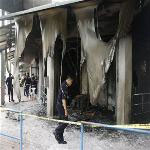
Recently, a series of attacks on Christian churches and a Sikh temple in Malaysia focused attention on growing ethnic tension in the country. The Malaysian government, which has been promoting a "1Malaysia" campaign stressing racial and religious harmony, condemned the attacks. But, some critics say it may also be contributing to religious and racial divisions to solidify its political base.
A legal dispute over the word "Allah" divides Muslims and Catholics in Malaysia. The controversy started on December 31, when the Malaysian High Court allowed Roman Catholics to use "Allah" to refer to God. The government has appealed the verdict.
Although many Muslims attending prayer service at the National Mosque in Kuala Lumpur believe the word "Allah" is exclusive to Islam, few endorsed the violent attacks on nine churches and a Sikh temple that followed the court ruling.
"We think it could be created, you know, to make people believe there are violence in religions here but, in fact it is not," said a Muslim man.
At Saint Ann's Church, Father Lawrence Andrew says the government's swift response to protect churches has been reassuring but the experience has left Catholic community in Malaysia concerned. "We are not really upset about it, but what is psychologically disturbing is that people can be annoyed or feel insecure at the slightest differences that appear," he said.
Although the attacks appear religious in nature, political analysts here say they are more symptomatic of conflicting economic and political pressures on the leading government party, the United Malays National Organization, or UMNO.
Charles Santiago is an opposition member of parliament with the Democratic Action Party. He says UMNO maintained power for years by giving special treatment to its core constituency - ethnic Muslim Malays, who make up 60 percent of the population.
"I am UMNO, the protector, and I will give you the money. I will give you all development and all you have to do is every once in five years make sure you come and vote for me, and this thing will go on," said Santiago.
However, to become more competitive in the global economy, the government is trying to rollback its system of ethnic preferences, which requires companies to reserve 30 percent of their shares for Malays.
The government public relations campaign, called "1Malaysia," which advocates the values of tolerance and equality, was designed, in part, to push public acceptance of these economic changes.
But after the 2008 elections, in which many Malays voted for the opposition, UMNO had to change its tactics.
Zakaria Ahmad is a professor of politics with Help University in Kuala Lumpur. He says, to shore up its support within the Muslim Malay community, the government now has to support or at least tolerate more hardline actions on issues of race and religion. "I think there is a breakdown of law and order, but it is not lawlessness. It is just the government seems to be unable to cope - doesn't seem to have the political will to enforce laws as before," said Ahmad.
In addition to the controversy about the use of the word Allah, the judicial system has put new emphasis on enforcing Sharia law among Muslims. In recent months, three Muslim women have been caned for sexual misconduct.
Marina Mahathir, a women's rights advocate and daughter of former Prime Minister Mahathir Mohamad, says there are more instances of police monitoring personal behavior. "There was a recent story about wanting to, on Valentine's Day, raid people having romantic candlelit dinners, Muslim couples having romantic candlelit, I mean, what business of it is of theirs and really don't they have better things to do? And, that is what our leadership should be saying, 'Don't you have better things to do," she said.
Law Professor Yusri Mohammad, with the International University in Malaysia, says the Muslim community is not becoming more conservative, but it is trying to hold on to its values and way of life. "You can't have non-Malay things that you may feel some people in countries are having that you would also like to have; but if you inject that within a Malaysian setting it becomes disruptive. It becomes - it disturbs the balance we have," he said.
He says, although some politicians may think that conflict can help them win votes, most Malaysians still embrace moderation and respect for all races and religions.
Sikh temple: 錫克廟
Muslim washing rite goes hi-tech
Obama seeks 'new beginning' for US, Muslims
Letting religion into the classroom, but setting limits
(來源:VOA 編輯:陳丹妮)
